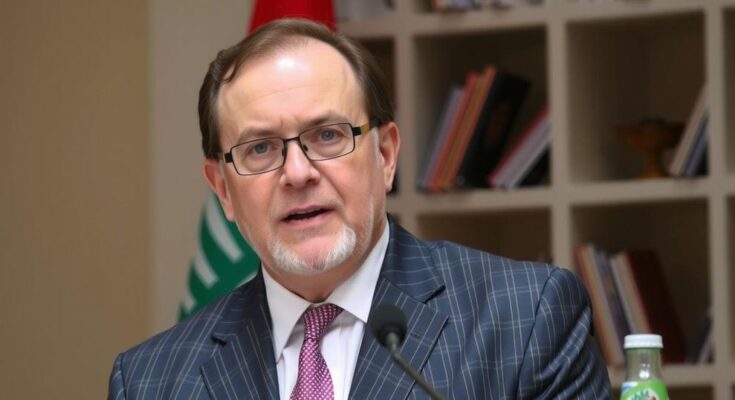Nawaf Salam has been appointed as Lebanon’s new prime minister, following a parliamentary vote that favored him over caretaker PM Najib Mikati. This nomination reflects a shift in political dynamics amidst Hezbollah’s declining influence. Salam, who has an esteemed legal background, now must navigate Lebanon’s multifaceted crises, including economic downturns and sectarian divisions, while forming a government and implementing necessary reforms.
Nawaf Salam, the current president of the International Court of Justice (ICJ), has been appointed as Lebanon’s new prime minister. His nomination comes after two-thirds of the 128 parliament members voted for him during discussions with newly elected President Joseph Aoun. Salam, who is 71 years old, will take on a role traditionally filled by a Sunni Muslim, following the precedent of Lebanon’s sectarian power-sharing system. His predecessor, caretaker Prime Minister Najib Mikati, received a mere nine votes in the process.
Salam’s elevation to the premiership marks a significant setback for Hezbollah, which had aimed to retain Mikati as prime minister but ultimately did not propose a candidate. The group has seen its influence notably diminished following its recent conflict with Israel. In response, senior Hezbollah legislator Mohammed Raad criticized their political rivals for inciting division and lamented that despite their collaboration in supporting Aoun’s presidential campaign, they were met with exclusion and hostility. He cautioned that any government failing to uphold coexistence would lack legitimacy.
Conversely, Salam received support from various Christian and Sunni factions, who view him as a champion of reform. Gebran Bassil, a leader within the Maronite Christian community, referred to Salam as the “face of reform,” while Faisal Karami, a Sunni parliamentarian, indicated his endorsement was motivated by demands for change and potential international aid for Lebanon.
Salam hails from a notable Sunni family in Beirut and has an impressive academic background, holding multiple advanced degrees from prestigious institutions. His legal career includes serving as Lebanon’s permanent representative to the United Nations from 2007 to 2017 before his appointment to the ICJ in 2018. On numerous occasions, he has engaged in high-level international legal adjudications, such as overseeing cases involving serious allegations against Israel concerning actions in Gaza.
Following his nomination, Salam must assemble a cabinet that can garner trust within a deeply polarized parliament. His appointment comes on the heels of Aoun’s presidency, which was supported by a coalition of political parties, including backing from major Western and regional powers. Aoun has emphasized the need for reforms to address Lebanon’s significant challenges, including the ongoing economic downturn and the consequences of the devastating 2020 Beirut port explosion.
The selection of Nawaf Salam as Lebanon’s prime minister occurs within the context of Lebanon’s complex sectarian political system, which mandates that the post be held by a Sunni Muslim. This system is integral to the country’s governance structure designed to ensure representation among its diverse religious communities. Salam’s appointment follows a turbulent period for Hezbollah, which has experienced a reduction in power after its military engagements with Israel. His nomination is seen as a vital step toward potential political reform amidst Lebanon’s sweeping economic crisis, which is considered one of the worst in the country’s history, exacerbated by domestic instability and external pressures.
Nawaf Salam’s appointment as prime minister signifies a pivotal moment in Lebanon’s political landscape, especially as he prepares to form a Cabinet in a context marked by sectarian challenges and economic turmoil. The support he garnered from both Christian and Sunni factions highlights a possible shift towards reform, notwithstanding the opposition from Hezbollah. His academic and legal expertise could prove critical in addressing the myriad crises facing Lebanon, particularly in the realms of governance and international relations.
Original Source: www.bbc.com




